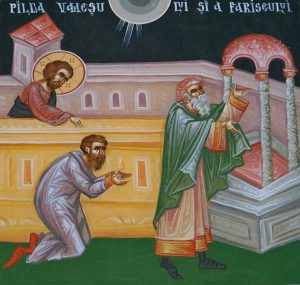 This Sunday’s Gospel begins our preparation for the Great Fast. It seems to turn the whole purpose of the Fast on its head. The Pharisee boasts of “fasting twice a week,” and “giving tithes of all I possess,” and thanks God that he is not like other men. But Jesus says he is not justified. Our Lord does not speak of how these two men lived their lives outside the temple. He does not speak explicitly of whether the tax collector repented, though Zaccheus did repent to receive the Lord’s mercy and forgiveness. But our Lord focuses on one reality only: what do we believe in our heart. I had a friend who said that if he didn’t fast during Lent, he would not feel himself worthy of Communion on Pascha. But to win salvation for ourselves is not the purpose of the Fast – we fast only to come to an understanding that we cannot save ourselves by our own merits.
This Sunday’s Gospel begins our preparation for the Great Fast. It seems to turn the whole purpose of the Fast on its head. The Pharisee boasts of “fasting twice a week,” and “giving tithes of all I possess,” and thanks God that he is not like other men. But Jesus says he is not justified. Our Lord does not speak of how these two men lived their lives outside the temple. He does not speak explicitly of whether the tax collector repented, though Zaccheus did repent to receive the Lord’s mercy and forgiveness. But our Lord focuses on one reality only: what do we believe in our heart. I had a friend who said that if he didn’t fast during Lent, he would not feel himself worthy of Communion on Pascha. But to win salvation for ourselves is not the purpose of the Fast – we fast only to come to an understanding that we cannot save ourselves by our own merits.
The tax collector understood this and was saved. The Pharisee was proud and missed God’s grace. Certainly our Lord does not consider fasting and tithing “bad behavior,” but to take pride in them is ignorance. In every Communion and in the whole great fast, we must pray in the depths of our hearts and minds as the Liturgy does: “O God, be merciful to me a sinner! O God, cleanse me of my sins and have mercy on me! O God, forgive me for I have sinned without number!”
Meditation by Archpriest David Petras
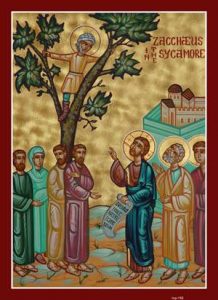 Meditation on Sunday’s Scripture readings 1 Timothy 4:9-16; Luke 19:1-10
Meditation on Sunday’s Scripture readings 1 Timothy 4:9-16; Luke 19:1-10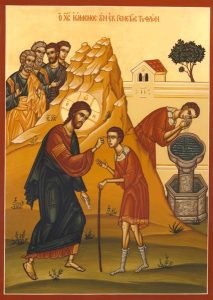 1 Timothy 1:15-17; Luke 18:35-43 (Readings of the 31st Sunday after Pentecost)
1 Timothy 1:15-17; Luke 18:35-43 (Readings of the 31st Sunday after Pentecost) Colossians 3:12-16; Luke 18:18-27 (Readings of the 30th Sunday after Pentecost)
Colossians 3:12-16; Luke 18:18-27 (Readings of the 30th Sunday after Pentecost)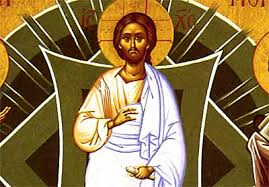 When we began the Feasts of Light on the second Sunday before Christmas, the first words of Scripture were: “When Christ our life appears, then you will also appear with him in glory. (Colossians 3:4). Today, the last words from Scripture for this feast are: “The people who sat in darkness have seen a great light, and upon those who sat in the region and shadow of death Light has dawned. (Matthew 12:16)” St. Paul in his epistle writes about Jesus descending and ascending: “He who descended is also the One who ascended far above all the heavens, that he might fill all things (Ephesians 4:10)”
When we began the Feasts of Light on the second Sunday before Christmas, the first words of Scripture were: “When Christ our life appears, then you will also appear with him in glory. (Colossians 3:4). Today, the last words from Scripture for this feast are: “The people who sat in darkness have seen a great light, and upon those who sat in the region and shadow of death Light has dawned. (Matthew 12:16)” St. Paul in his epistle writes about Jesus descending and ascending: “He who descended is also the One who ascended far above all the heavens, that he might fill all things (Ephesians 4:10)”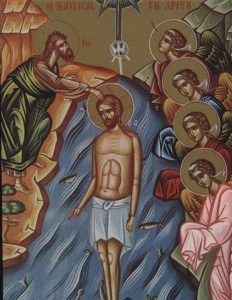 Divine Liturgy for Theophany of Our Lord, Friday, January 6
Divine Liturgy for Theophany of Our Lord, Friday, January 6